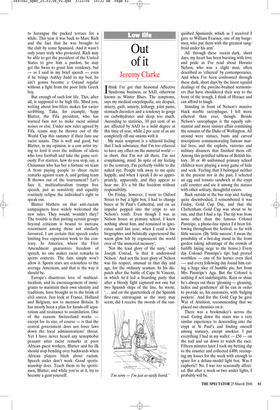Out of it
Jeremy Clarke
Ithink I’ve got that Seasonal Affective Syndrome business, or SAD, otherwise known as Winter Blues. The symptoms, says my medical encyclopedia, are despair, misery, guilt, anxiety, lethargy, joint pains, stomach disorders and a tendency to gorge on carbohydrates and sleep too much. According to statistics, 10 per cent of us are affected by SAD to a mild degree at this time of year, while 2 per cent of us are completely off our onions with it.
My main symptom is a schizoid feeling that I lack substance, that I’m too ethereal to have any effect on the material world in short, that I’m not all there. I’m not complaining, mind. In spite of my feeling to the contrary, I’m perfectly visible to the naked eye. People talk away to me quite happily, and when I speak I do so appropriately, apparently, and they appear to hear me. It’s a bit like freedom without responsibility.
On Friday, however, I went to Oxford Street to buy a light box. I had to change buses at St Paul’s Cathedral, and on an impulse popped into the crypt to see Nelson’s tomb. Even though I was in Nelson house at primary school, I knew nothing about him, and remained in ignorance until last year, when I read a few biographies and belatedly experienced the warm glow felt by cognoscenti the world over of ‘the immortal memory’.
‘Not the least glory of the navy,’ said Joseph Conrad, ‘is that it understood Nelson.’ And not the least glory of Nelson was his respect, unusual in that day and age, for the ordinary seaman. In his dispatch after the battle of Cape St Vincent, in which he’d led a boarding party that after a bloody fight captured not one but two Spanish ships of the line, he wrote, ‘... and on the quarterdeck of the Spanish first-rate, extravagant as the story may seem, did I receive the swords of the van quished Spaniards; which as I received I gave to William Fearney, one of my bargemen, who put them with the greatest sangfroid under his arm’.
All through these recent dark, short days, my heart has been bursting with love and pride as I’ve read about Horatio Nelson, who was a slight man, often described as ‘ethereal’ by contemporaries. And when I’ve been confronted through these dark, short days by the latest squalid dealings of the porcine-brained sermonisers that have shouldered their way to the front of the trough, I think of Horace and can afford to laugh.
Standing in front of Nelson’s massive black marble sarcophagus, I felt more ethereal than ever, though. Beside Nelson’s sarcophagus is the equally substantial and more sinister affair containing the remains of the Duke of Wellington. All around were statues, busts and carved inscriptions commemorating famous martial lives, and the exploits, victories and military disasters that finished them off. Among this petrified tableau of British history, 30 or 40 uniformed primary school children were playing a noisy game of hide and seek. Feeling that I belonged neither in the present nor in the past, I selected an egg and tomato sandwich at the crypt café counter and ate it among the statues with other solitary, thoughtful eaters.
Back outside at the bus stop and feeling quite disembodied, I remembered it was Friday, Gold Cup Day, and that the Cheltenham Gold Cup was about to be run, and that I had a tip. The tip was from none other than the famous Colonel Pinstripe, a phone-line tipster I’d been following throughout the festival, so far with little success. (By ‘little success’, I mean the possibility of a hot-dog stand in the front garden taking advantage of the crowds of bailiffs laying siege to the house.) Every day Colonel Pinstripe’s tips had proved worthless — one of his horses even died —and every following day found him eating a huge slice of humble pie, hot from Mrs Pinstripe’s Aga. But the Colonel is nothing if not indefatigable. Rain or shine he’s always out there ‘gleaning — gleaning, ladies and gentlemen’ all he can in order to provide us, his customers, with ‘bulging pockets’. And for the Gold Cup he gave War of Attrition, recommending that we placed our chemises on it.
There was a bookmaker’s across the road. Going down the stairs was a very similar experience to descending into the crypt at St Paul’s and finding oneself among statuary, except smokier. I put everything I had in my wallet — £50 — on the nail and sat down to watch the race. Fifteen minutes later I took my betting slip to the counter and collected £400, recouping my losses for the week with enough to spare for a deluxe-model light box. Was I euphoric? No. I was too seasonally affected. But after a week or two under lights, I probably will be.























































 Previous page
Previous page